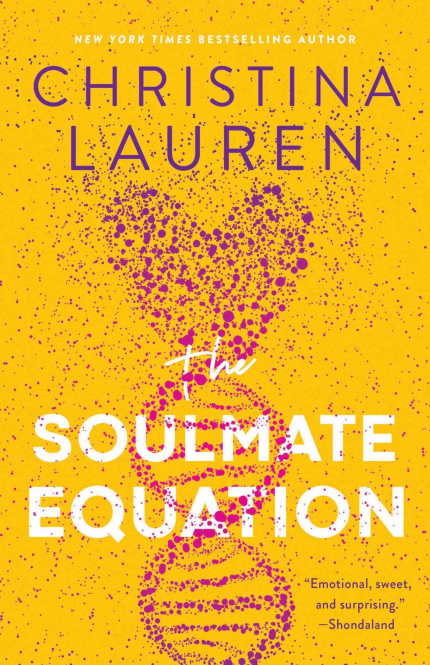The Soulmate Equation, by Christina Lauren

The Soulmate Equation by Christina Lauren
My rating: 4 of 5 stars
“People who believe in soulmates commonly accept that one will feel ‘complete’ once they have found their soulmate, as it is partially in the perceived definition that two souls are meant to unite.”
(Wikipedia contributors. (2023, May 17). Soulmate. In Wikipedia, The Free Encyclopedia. Retrieved 09:12, June 8, 2023, from https://en.wikipedia.org/w/index.php?…)
I don’t believe in soulmates. I believe in compatibility; in growing together, in growing in parallel and, yes, in growing apart. In fact, I feel that looking for someone else to “complete” oneself is, in many ways, highly problematic: Is such an expectation of a soulmate even realistic? Is anyone “incomplete” until such a soulmate has somehow materialised?
It is important to cultivate a sense of self-worth and fulfilment outside of a romantic relationship, and to recognize that a partner should complement, rather than complete, one’s life.
So, what even brought me to read a book that would, obviously, be about soulmates? The promise of a nerdy romance! Sadly, even that didn’t really work out: Jess, our heroine, is a statistician but apart from earning her livelihood and at one important point in the novel, that hardly plays any role. River, her potential “soulmate”, is a geneticist – or so he says because that, too, is “established” by a lame Gregor Mendel pun… Thus, this is more of a romance novel with some light nods to the characters’ professions rather than a ‘nerdy romance’.
»He was most comfortable when facing the fume hood with his back to the room, just him and some tubes and billions and billions of paired-up nucleotides.«
(Give me a computer any old day and I’ll be out of your hair for any length of time!)
The humour fluctuates between that of adolescents…
»Listen to this tagline: ‘Your future is already inside you.’ Wow.” She set the card down and leaned back, grinning. “‘Inside you’? Did anyone read that out loud first?”«
(Keep in mind: Jess turns 30 during the narrated time, her best friend, Fizzy, is slightly older…)
… and more subtle and witty, with a touch of irony…
»She was flanked by an empty seat on each side, a little buffer zone to protect the other parents from the infection of singlehood.«
What also annoyed me was the intense level of Jess insecurity, overthinking and the mental drama she creates at times…
»If she could only make herself believe this result, learning to tolerate his face for the sake of science wouldn’t be the worst thing in the world, would it?«
Enough of the negative, though, and let’s move to the positive aspects that made me finish this. First and foremost: I liked the realistic portrayal of Jess as a parent: She tries to do her best, fails, tries again, and does it better. Shockingly much of parenthood is trial and error and the results often aren’t less than ideal and even much less than what one tried to achieve. You can read books, you can try to prepare, you can make plans – you might not make the same mistakes your parents made but you will mess up. You can only take responsibility for said messes and keep trying your best with all the love you can give. And a little help sometimes…
»Pink? Purple? Polka dot? Knock yourself out, kid. Jess had never had the luxury of being frivolous before; it felt strange but also wonderful. She watched Juno finish her dinner and pull out the iPad again, humming as she added art supplies to her cart.
Whoever said money couldn’t buy happiness had never seen this.«
That said, I really liked how River interacted with Juno: treating her as an equal, never condescending, always empathetic – his behaviour in this regard is a real highlight. (Although it’s always easier when it’s not your own child that you spend 24 hours a day with.)
I also very much enjoyed the friendship between Jess and Fizzy. The chemistry those two had eclipsed that of Jess and River at times. I have a feeling that this might not be a coincidence…
»And, finally, to each other we say: You are my best, and here you are my only. And look … we just wrote a book about soulmates. Funny thing, that.«
(From the acknowledgements.)
The communication between Jess and River was both enjoyable and frustrating: Jess recognizes a lot of good in River – and doesn’t tell him. Even after situations that would have caused other relationships to fail, but not theirs, Jess still can’t express her growing feelings. On the other hand, River shows his feelings and communicates non-verbally quite successfully. However, he makes significant mistakes towards the end, which Jess is able to compensate for.
All in all, this would have been a three-star reading experience for me, if it weren’t for this one thing…
»“I haven’t been home in years, but I feel that way with you.”«
I too have found my home in a person. Unexpected, atypical, and head over heels. That was almost a quarter of a century ago. It wasn’t always easy. We have grown, and grown together, raised three children. I don’t believe in soulmates. I believe in you, C., and I love you.
Four stars out of five!
Ceterum censeo Putin esse delendam
View all my reviews